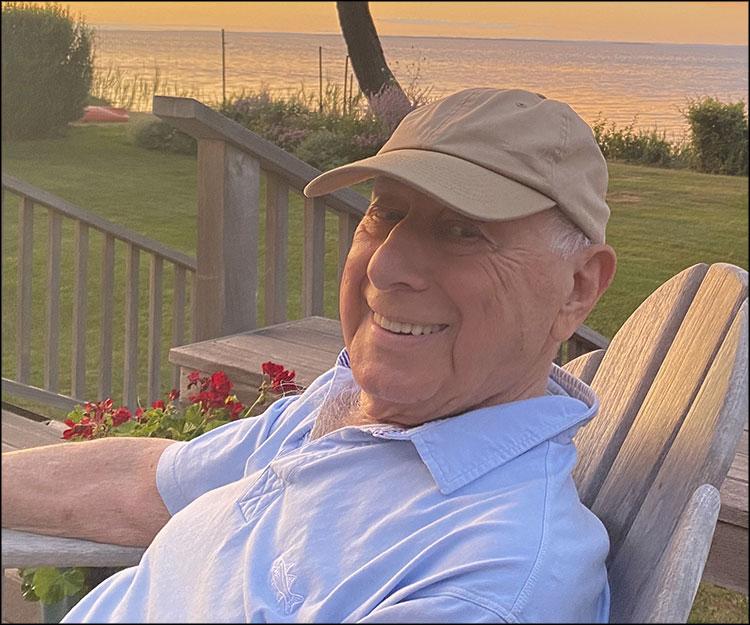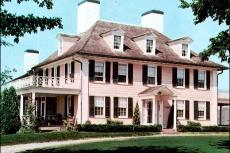Paul Libin, acknowledged on Broadway as one of the most influential and successful producers in theatrical history and a Springs homeowner for about 60 years, died on June 28 in a Manhattan hospital at the age of 94. His death was marked by an outpouring of acclaim from many who worked with him, wrote about him, or benefited from his business acumen, directorial guidance, and philanthropy.
During a prolific career that spanned 61 years, Mr. Libin took on almost every role the theater has to offer, from actor and backstage manager to lighting designer and technical director, finding fame while still a young man with his first production, a 1958 Off Broadway revival of “The Crucible.” He staged it in the ballroom of a hotel on West 32nd Street, having noticed a sign outside advertising that the room was available for rent and thinking it might be big enough for a theater-in-the-round. It was a huge success, running for over 500 performances and far outpacing the original 1953 Broadway production in ticket sales.
Altogether, Mr. Libin produced more than 250 Broadway, Off Broadway, and touring productions, and received 12 Tony Awards, including, in 2013, a special Tony for lifetime achievement in the theater. In 2016 he was inducted into the Theater Hall of Fame, which is inside Broadway’s Gershwin Theater, where members’ names are inscribed in raised gold letters on the walls of the upper rotunda.
“The Crucible” is, of course, by Arthur Miller, and coincidentally (or maybe not), it was Miller’s “Death of a Salesman” that first inspired Mr. Libin to think of the stage as a career. He was studying international relations at the University of Illinois in Chicago at the time, the late 1940s, and transferred to Columbia University’s School of the Arts after seeing that play.
Mr. Libin “discovered, supported, and produced some of the greatest talents of the American theater, with a grace, intelligence, and humor that made him a beloved figure in an often difficult and contentious industry,” the Public Theater said in a tribute following his death. “He was a pleasure to negotiate with, a joy to problem-solve with, and a delight to listen to, he had stories that wouldn’t quit. Although he had spent half a century in the commercial theater, it was an artist’s heart still beating in his breast.”
Playbill, citing his many managerial roles, summed him up as a “titan of the business of Broadway.” Rocco Landesman, the former president of Jujamcyn Theaters, expanded on that: “I wouldn’t describe his role as corporate,” he said. “He was as likely to be climbing into the air-conditioning ducts at the St. James Theater as he was to be sitting at his desk.” (The two men were colleagues for 28 years, during which Mr. Libin, as executive vice president and producing director of Jujamcyn, which owned five of Broadway’s 41 theaters, played a key role in bringing such trailblazing works to the stage as “Angels in America,” “The Producers,” and “Love! Valour! Compassion!”)
At Circle in the Square, which he founded 62 years ago in a handshake partnership with Theodore Mann, his landmark productions included “The Iceman Cometh,” “Uncle Vanya,” “Death of a Salesman,” and “True West,” among many others. He remained president of the theater right up until his death; his most recent production, “Just in Time,” starring Jonathan Groff, is there right now.
Born in Chicago on Dec. 12, 1930, to Ely and Chaika (Belatzkin) Libin, Russian immigrants who ran a grocery store, Mr. Libin was a lifelong philanthropist as well. He headed Broadway Cares/Equity Fights AIDS for over 24 years until 2018.
“His strength, generosity of spirit, and deep decency made an indelible mark on me and everyone at Broadway Cares/Equity Fights AIDS,” said Tom Viola, its recently retired executive director. “He oversaw remarkable growth in the organization’s philanthropic reach.” Recalling the agency’s formation early in the AIDS crisis, Mr. Libin once famously remarked that “We couldn’t not do something.”
Not surprisingly, he was also a strong supporter of Bay Street Theater in Sag Harbor and of East Hampton’s Guild Hall. He was one of the earliest notables elected to Guild Hall’s Academy of the Arts.
“My father and my mother, Florence Rowe Libin, first came out east from the city in the early 1960s to spend summers at the old Salter’s Cottages in Springs,” his daughter Andrea Libin wrote. “My dad often described to me his first night when the moon rose over Gardiner’s Bay and how when he woke early the next morning the sun was reflecting in the same spot and that was it — he fell in love, as did my mom.”
Some years later, the Libins bought land on the bay nearby and built a house. “Aside from the foundation and shell, my dad built all of the interior himself, with a little help from my mom, my older siblings, and me,” and they split their time between the city and Springs, “driving out every weekend, year round. They were integrated in the community of artists, writers, and fellow theater folks of the ’60s, ’70s, and ’80s to the present.”
“Though a Chicago city kid, my dad connected deeply with the landscape,” his daughter said, “teaching himself to sail a day boat, and could tell you the weather prediction by the wind and sky. He was someone who relished connecting with everyone in the community. My dad loved to go early in the mornings to Barnes Country Store to pick up the paper and chat with the owners and other regulars; he did the same at the Springs General Store.”
“It brings real solace that just weeks before my dad’s passing, he and my mom, and my husband and I, spent several days at the Springs house. He sat out on the deck, with a blanket as it was a cold and windy June day, and gazed out at the bay.”
The Libins were married for 70 years. In addition to his wife and his daughter Andrea and her husband, John High, of Portugal and New York City, Mr. Libin is survived by another daughter, Claire Libin of Santa Fe, N.M., and a son, Charles Libin, and his wife, Mindy Goldstein, of Brooklyn. He also leaves three adult grandchildren, Travis Libin, Milah Libin, and Sasha High, all of whom live in Brooklyn.
The family has suggested memorial donations to Broadway Cares/Equity Fights AIDS or the Entertainment Community Fund. A celebration of life is planned; the date will be announced.




